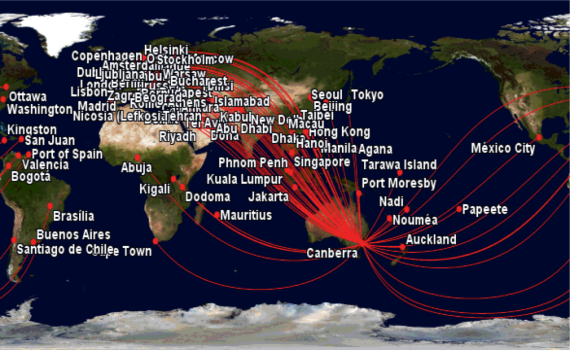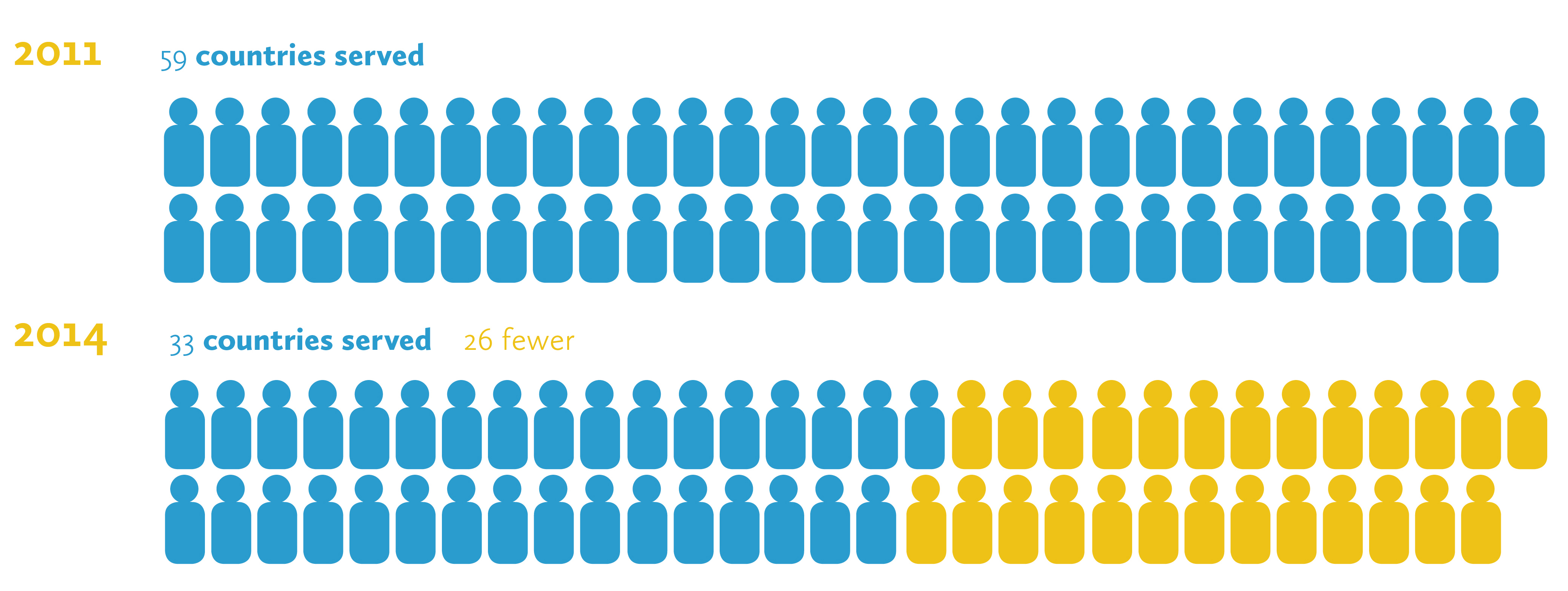
This blog was updated in July 2016 to include data from 2015 and to coincide with the termination of the British Library international, non-commercial document supply service.
Document delivery is a vital service in meeting the particular information needs of individual researchers, students and scholars.
In January 2012, the British Library, one of the world’s largest research libraries, ceased its international document supply service that was supported by a copyright exception (known as the Overseas Library Privilege Service), to protect the library from claims of copyright infringement.
The service was replaced with a publisher-approved licensing arrangement, known as the International Non-Commercial Document Supply (INCD) service.
Data about the new licensed arrangement, obtained by EIFL under a Freedom of Information request, show that the impact on access to information has been dramatic.
The case of the British Library illustrates that international document delivery should be regulated by copyright law, not by licences.
Reduced titles, reduced service
Inter-library document supply is a managed system of resource-sharing between libraries that enables an end user to access specific resources that are not otherwise available to them. Requests are made on a non-commercial basis taking into account any copyright or licensing conditions. International requests are made when the material is not available locally.
Data received from the British Library, in response to a Freedom of Information request from EIFL, shows that the number of journal titles available under the non-commercial licensed service (INCD) fell by 93% from 330,700 titles in 2011 to 23,600 in 2012.

Figures show that 28,300 titles are no longer available at all, either at commercial or non-commercial rates. This means that more titles ‘disappeared’ than are available under the non-commercial licensed scheme.
A major contributing factor in the reduction of journal titles available to non-commercial users appears to be that the majority of titles are available only at higher commercial rates. Anecdotal evidence suggests that a single article at commercial rates can cost up to $80, too expensive for most academic and research library budgets.
“We did try the new British Library service a couple of times when nobody else on earth had what we needed. But because of the enormous increase in prices, we dare not even look at the website anymore.” - Library of the Lithuanian University of Educational Sciences
Fewer requests satisfied
How has the dramatic drop in the number of available journal titles affected the number of satisfied requests, that is, requested articles that have been successfully supplied?
By an equally dramatic drop, according to the figures obtained. In the first year of the new service (2012), the number of satisfied requests fell by 92% from 38,100 to 2,884. By the end of 2014, the number had fallen to only 1,057 satisfied requests in a year-on-year reduction, an overall drop of 97%.

Based on the number of satisfied requests in 2011, more than 100,000 requests for information could normally have been expected to have been fulfilled during 2012-2014.
More requests refused
While the British Library still has the documents, of course, under the new licensing arrangement they are in many cases no longer allowed to provide them. In fact, in 2012 more requests for information were refused due to licensing restrictions (2,942), than were satisfied under the new INCD service (2,884).

“In 2012, a patron at Columbia University requested two pages from an early twentieth century literary journal found only at the British Library. Although the Library had the journal, it was not allowed to send the pages. The patron couldn’t comprehend the refusal”. Peter Bae, former Head of Delivery Services, Columbia University
Fewer countries served
With its rich, multi-lingual collections covering every subject, the British Library is used as a back-up by libraries in many countries.
In 2011 the Library provided information to libraries in 59 countries (almost one third of WIPO Member States) under the Overseas Library Privilege Service. By 2014, the number of countries served had fallen to 33.

Finding alternative sources takes time and expertise
The British Library is often used as a ‘library of last resort’ when the item cannot be located anywhere else.
Finding alternative sources for material that is not readily available takes time and expertise. Libraries that employ specialist inter-library document supply librarians might have a chance of tracking down hard-to-find items using their expert knowledge, networking skills and online resources. At less well-resourced institutions, and at the majority of libraries that do not have access to specialist staff, faculty, researchers and students are at a loss.
When the item cannot be found, it denies or delays research. When the collection of a major library, such as the British Library, is put beyond the reach of libraries in other countries, the loss to the global library and research communities is significant.
Open access journals will increasingly alleviate the problem of scarcity of access.
For libraries in developing countries, philantrophic initiatives by publishers to provide free or low cost access are to be welcomed.
Direct delivery options such as pay-per-view are without doubt important to the institutions and the people who use them. For many individuals, however, pricing of international journal articles remains a barrier. For example, a single article can cost from $20-$40 in many cases. For students and researchers who need to read many dozens of articles over the course of their studies, it is a big, and in many cases, unrealistic financial burden. This is one reason why people turn to libraries - that collectively spend billions of dollars each year on content.
The high price of knowledge
Lack of affordability is not just an inconvenience. A recent article in the New York Times about the 2014 Ebola outbreak tells how public health workers in Liberia were stunned to find that articles written by European researchers and published in a number of journals indicated that Liberia should be included in the Ebola virus endemic zone.
What triggered their dismay was not the fact itself, but that the warning had been given as far back as 1982:
“Part of the problem is that none of these articles were co-written by a Liberian scientist. The investigators collected their samples, returned home and published the startling results in European medical journals. Few Liberians were then trained in laboratory or epidemiological methods. Even today, downloading one of the papers would cost a physician here $45, about half a week’s salary.” (Yes, We Were Warned About Ebola, New York Times, 17 April 2015.)
A policy failure?
When information for science and scholarship is difficult to obtain due to copyright or licensing restrictions, what are the consequences?
For students and faculty around the world, it makes their research more difficult. It sends out the message that copyright is a barrier to research and learning.
For libraries, it reduces their effectiveness in supporting science and scholarship. It undermines the library’s role in explaining the importance of copyright to their users.
From the policy perspective, it reduces efforts to build respect for the law in society. If people cannot get reasonable access to content they need for education, leisure and lifelong learning, it represents a policy failure.
A copyright exception to support international document delivery
Quality research requires access to a broad range of research materials. We know that world class research requires an information infrastructure that supports easy access to international research results. And we also know that lack of access means missed opportunities and delayed discoveries.
International document delivery is a vital supplementary service in meeting the particular information needs of individual researchers, students and scholars.
The case of the British Library shows that licensing is not the solution.
According to the WIPO Study on Copyright Limitations and Exceptions for Libraries and Archives, just 11% of countries have an exception for document supply in their national law, and almost no countries have addressed the issue of cross-border transfer of content.
While the data obtained from the British Library FOI request is telling, behind every number is a person who needs information in pursuit of their research or study. Who has located a reference to a journal article they would like to read, and who has asked their librarian to obtain it for them - at a reasonable cost and in a timely manner. And where the librarian in many cases must reply, “I’m sorry. Your request is not licensed to fill”.
This is why a copyright exception to support international inter-library document delivery is needed.
This blog expands on EIFL’s presentation at ‘Libraries and Archives: Information without Borders’ a lunchtime event held during the 30th session of WIPO’s Standing Committee on Copyright and Related Rights (SCCR) that took place in Geneva from 29 June - 3 July 2015.
Download the slides from the EIFL presentation.
Teresa Hackett is Copyright and Libraries Programme Manager for EIFL.
SHARE / PRINT







